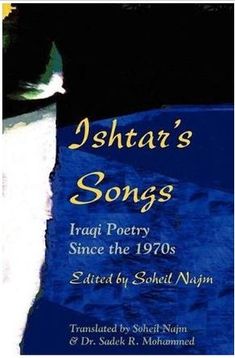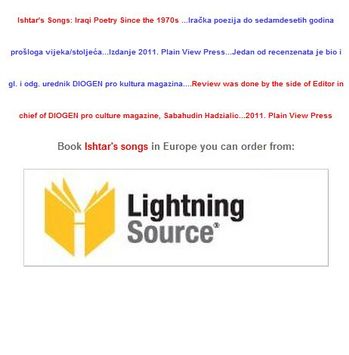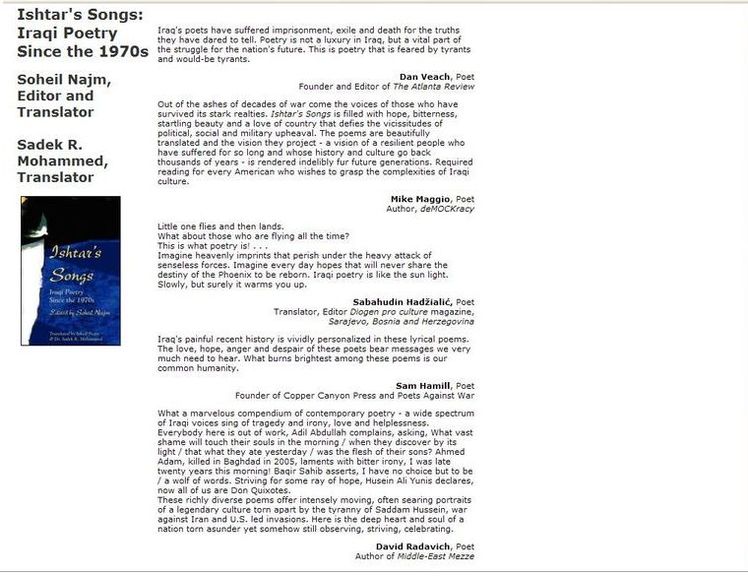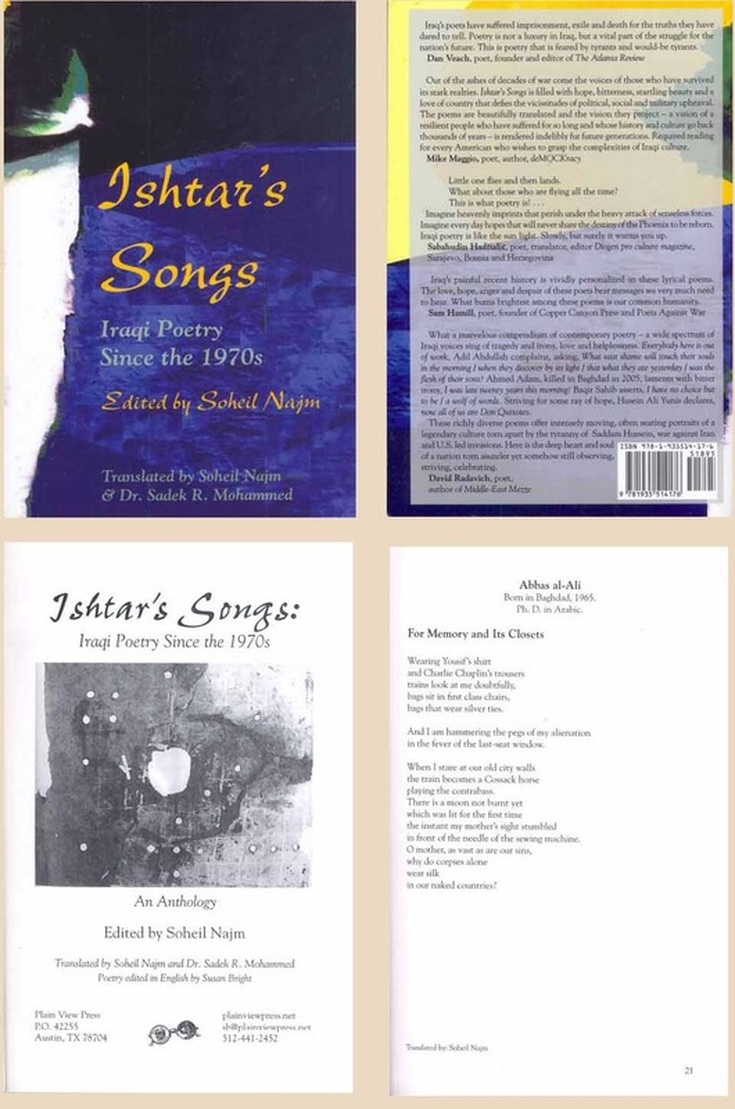Onaj, ko želi biti pticom, valjalo bi, za početak, da izgradi gnijezdo visoko na grebenu.
One, who wants to be a bird, should, to begin with, build a nest high on the ridge.
Sabahudin Hadžialić
One, who wants to be a bird, should, to begin with, build a nest high on the ridge.
Sabahudin Hadžialić
Ishtar's Songs: Iraqi Poetry Since the 1970s ...Iračka poezija do sedamdesetih godina prošloga vijeka/stoljeća...Izdanje 2011. Plain View Press, Austin, Texas, USA...Jedan od recenzenata je bio i gl. i odg. urednik DIOGEN pro kultura magazina i MaxMinus magazina....Review was done by the side of Editor in chief of DIOGEN pro culture magazine and MaxMinus magazine, Sabahudin Hadzialic...
2011. Plain View Press, Austin, Texas, USA
|
Recenzija Antologije Iračke poezije
OTVORENA VRATA RAJA? Ili, pod slavolukom Ištarske kapije... Zamisli transcedentnu ljepotu koja nestaje pod udarima varvara. Zamisli vaseljenske otiske koji nestaju pod čizmama dokonih. Zamisli ovozemaljske nade koje nikada neće postati Feniksom sudbine. Prozna poetika Iračkih pjesnika je refleksija stoljetnih, milenijskih sudbina naroda svetoga tla. Žestoko nemireći se sa svojom sudbinom, poetikom proznoga stiha pokušavaju izbjeći odavno zapisane valove usmjerenja. Pojedinačni odjsaji su ovdje unutar bujice gomile koja živjeti traži. Ništa više. Ali ni manje. Iračka poezija je kao svjetlo. Polako, ali sigurno raste u vama. Baagdad, grad svjetlosti nestaje pod udarima varvara čiji osnovni cilj nije stvarati vec razaranjem anulirati, brisati čak i sjećanja. Na tlo, ali i na one koji su opstajali tu kreirajući svjetske tokove kulturne i društvene budućnosti. Domaće otuđenje je nemogućnost iskaza drugačije do poetikom. Sramežljivom na samom početku, ali, vremenom, itekako interaktivnom. Mnoštvo je pjesnika u ovoj Antologiji. Ali je i moštvo isprepletenih sudbina kreiranih od strane kako vanjskih tako i unutrašnjih uticaja. Semantika riječi ovdje je izražena hiperbolama i homonimima, ali i višeznačnom upotrebom sinomima unutar meronimije kao odnosa dvije riječi od kojih je prva dio te cjeline, a druga upravo ta cjelina. Ne želim izdvajati nikoga jer Antologije su uvijek subjektivni oblici objektivne stvarnosti. Ova, za razliku od drugih, sličnih, zaslužuje upravo to. Da niko ne bude izdvojen. Kako? Zbog čega? Jednostavno, jer kvalitet predočenog sadržaja sui generis jeste Irak sam. I njegovi pjesnici. Koji čine mozaik predstavljenih djela sa jednim i jedinim cilje-razumjeti prostor i vrijeme gdje su pjesme nastajale. I zbog čega navedoh „prozna poetika“? Ponovo, da bih dodao kvalitet više jer ove pjesme se mogu čitati uprako kao...pjesme, ali i kao...priče...života, ne samo jednog. Već mnogoznačno isprepletenog. Bezbojnost sunca sa kojim se susreću unutar Mrtvog mora tih prostora stvara sliku nekih novih, pretpostavljenih, vizija. Njima samo znanih, ali i nama predočenih. Kako drugačije odgovoriti do pjesmom na pjesmu što i ja činim upravo sada: Isprazni prostori izmanipulsane vjere protiv čovjeka bez sebe ali sa vjerom. Zbog nas! Irački pjesnici su proza duše. Ne samo svoje. Vidljivost višeslojne ritmike u pjesmama bez klasične rime čine ovu poetiku čudesno blaženom. I kaoContradictio in adiecto uz riječi „Vino Sultana“ pokazuju da smo mi, sada i ovdje, nevjernici duše. Jer, zbog čega provesti život a da niste probali vino, vino kod Sultana. Dužina pjesama je jednostavan oblik prezentacije duha. Ponaosob, svakog od pjesnika. Upravo to je i odgovor šarolikosti predstavljenog sadržaja. Od kratkih, „kroki“ pjesama do tužnih etida, sonetom omeđenoih. Sve je pred nama. Istinski toplo, iskreno, transparentno. I Ljubav je tu. Postaje pjesmom i zaluđuje sve što hode zemljom ovom uz krik „Prekrasno!“. Ljubav vodi pojedinačnu poetiku i u ovoj Antologiji. Ka zaluđenossti opštoj. Zaista, dok kolektivna nezaposlenost sudbine suštinske opstaje sve dok se sunce ponovo ne digne. Nestalo sunce. Iračko. Čak i izbrisane strofe opstaju u misslima nadanja. Radi budućnosti. I pjesme. Njeegove. Ili njene. Istovremeno, novi val moderne ulazi, bez obzira na sve objede usmjerena blokadi duha, i obasipa pjesnike tamošnje. Zar rečeno „zamisli da si dan!“ nije zaista nešto drugo, novo, inspirativno. Jeste. Itekako. I dalje, i jače, i suštinskije grade, uz poneku aforističku frazu unutar pjesama, uobličeni oblik samo njima znanog univerzuma. Dok postaju tijela koja govore svojim udovima. I krvavim željama. U zemlji koja nestaje. A opstanku teži. Bez budućnosti koja je nestala sa svih balkona, pjesnici pokušavaju svoj mir pronaći u trci sa vremenom. Ne samo svojim. Jer oni prolaze, jer postoje. A vrijeme ne prolazi. Jer ne postoji. U gradu Bagdadu koji liči na kacigu. No, kakav je kada se kaciga skine, neka vam pjesma kaže. U meni odjekuje. I Adam/Adem i Eva/Hava su dio njihovih priča. Surova, ali istinom obljepljena pjesme. Pardon, pjesme. Radi se o dva lika. Ili se varam? Dok duhovi masovnih grobnica kreiraju današnje snove. Kako se zove zemlja ovih pjesnika? Gdje je ona? U namjeri težnje? U oluji sreće? U srcu izvađenome? U buđenju iz života samog? U ideji atoma? Ne to je za male. Mali lete i zatim slete. Šta ćemos a onima koji non-stop lete?..To je upravo poezija koju iščitavamo u Antologiji koja je pred nama. Savremena u prirodi svojoj, ali itekako historijski omeđena društvenim obujmom cilja. Koji je na tim prostorima kreirao. Sve dok nije bio razoren od strane unutrašnjih slabosti vanjskih jakosti - U prevodu: Ludilom diktature koja je dokrajčena drugim ludilom- demokrature! Ovaj autor živješe jednom u zemlji takvoj. Gle vladaše najplemenitiji diktator svih vremena. Ali, ipak, bješe diktator. Ovaj autor živješe jednom u zemlji takvoj. Koju razaraše domaći varvari. Samo zbgo činjenice da ovdje žive tri plemena istog nardoa, ali uz nikad odgovoreno pitanje – KOJEG?...Kako kod njih bješe? Ne znam. Ali osjećam da su i njihove pjesme poetika bunta. Zbog sveopšte diktature duha koja vlada cijelom planetom Zemljom. Kako kod domaćih tako i stranih...varvara. A svi smo ljudi. I umrijećemo. Bez obzira bili zeleni, crveni, plavi ili žuti. Kao i bijeli. I crni. Problem je u Statui pjesnika. Odnosno, ko će na posljednjem balu, kao onomad u Bulgakovljevom romanu „Majstor i Margarita“ na pladnju donijeti posljednju glavu i reći: „Ti ne vjeruješ. U tom slučaju ti ideš u nebitisanje“. Ko će izgraditi posljednju statuu? Ko? Ne samo ljudi iz Bagdada već i iz Kirkuta, Basre se pitaju. Pjesnici, ali ljudi, iznad svega! Ovi pjesnici vjeruju u alternativu koja je pred njima. ???...Da odgovor je u njihovoj poeziji. Kada pročitate, kazaće vam se samo. Moj posao je bio samo da vam vrata otvorim. Da li sam uspio? Ako ste pročitali i ovu rečenicu, uspio sam. p.s. Da ne zaboravim i prevode koji svojom suštinom nadjačavaju pitanja koja se rađaju. Vjerujem da su prevodi samo još jedna nagradnja u razumijevanju između kultura. Ne samo USA/IRAQ ali također i kod nas, Evropljanja. Nadam se. Sabahudin Hadžialić književnik i freelance novinar Sarajevo Bosna i Hercegovina Evropa |
Review of the Ishtar's Songs: Iraqi Poetry Since the Seventies
Under the Arch of the Ishtar Gate ? Immagine a picture of tanscedent beauty that perishes under the viscious invasion of barbarians. Immagine heavenly imprints that perish under the heavy attack of senseless forces. Immagine every day hopes that will never share Phoneix's destiny to be reborn. Prose poetry of Iraqi writers is the reflection of centuries, millenia of entwined destiny of people who lived in this sacred place. Passionately refusing to blindly follow their destiny, they are trying their best to change the course of predetermined fate through fusion of poetic and prosaic elements. Individual reflections are sparks of collective yearning to live. Nothing more, nothing less. Iraqi poetry is like the sun light. Slowly, but surely warms you up. Bahgdad, the city of light, perished many times under the attacks of barbarians. Their aim is to anihilate through destrucion and erase even memories. The barbarians destroy the land; destroy the people who live and build propserous societies thus shaping cultural and social future. Destruction of one's country, alienation of its people could only be communicated through poetry. Demure at the begining, shedding shyness as the time passes to the point that it became passionately engaged. Many poets are represented in this Anthology. There are a lots of interlinked destinies shaped by internal and external influences. Semantics is conveyed through hyperbolas and homonimes, through multilayerd use of synonymes accenuated through meronymy – the first word being the part of the whole and the second being its substance. I do not want to single out a particular poem because anthologes are always subjective form of objective relaity. This anthology deserves deviation from the rule. Who stands out ? And why ? Simply put, the quintessence of this anthology is Iraq sui generis. Iraq and its poets. The poems form a mosaic with the one and only aim – to understand the place and time defined by these poems. Let me explain my reference to prose poetry. This is to once again accentuate the quality, as you can read these poems as...poems, or as prose...stories...of life, many lives. Engangled, entwined and interlocked lives. The fierce sun that schorches the lands of Iraq paints a picture of new, assumed visions. Visons that they inimately know, visions that they shared with us. These poets have a strong belief in the alternative that is ahead of them. ??? ...Yes, there is an altnative and the answer is in their poetry. Go ahead, read it and you'll understand. The only reply that resonates is through a poem: Desolate Interludes Of manipulated Faith Aganst mankind With Faith. All for our good ! Iraqi poets are soulful. They touch our inner being. Devine tones of this poetry are felt through multilayered rythm of the poems. 'The Wine of the Sultans' while being contradictio in adiecto, illustrates that we, who live in the now and here, are souls devoid of fate. Is the life worth living if you have not tasted the wine of the sultans. The length of poems is a simple form of poets' interaction with the world. Individually. This is what makes the content buzzing with diversity. From short 'croquis' poems to melanchonic etudes using the sonnet form. The beauty reveals itself. Warm, honest, transparent. And there is love. It starts with a poem, enticement and climaxes in a cry 'How wonderful!'. This Anthology celebrates love through individual poetics. The madness of all. Collective lull persists until the sun rises again. The persihed sun. The Iraqi sun. The wiped out verses survive through hope. And future. And poetry. His or hers. The new wave of modern poetry makes its entrance, regardless of spiritual constraints, and breathes through the pores of Iraqi poets. 'Who can immagine being a day!' is fresh, inspirational and profound. And they go on, unabashed, aided by aphorisms embeded in poems, forming the shape of thier own universum while becoming a disembodied and living in the country that is dissapearing while striving to survive. Deprived of future that withdrew from their horizons, the poets are trying to find peace in the race against time. Not only their time. They perish, because they are. The time does not perish. Because it is not. In the city of Bahgdad that resembles helmet. You will find your Bahgdad when you take the helmet off and hear the poem. The poem reverbratres in me. Adam/Adem and Eve/Hava are the part of their stories. Brutal and wraped in truth. A poem. Excuse me, poems. It is the story of two characters. Or am I mistaken. While the ghosts of mass graves paint today's dreams. These poets come from which country ? Where is this country ? Unintended hope ? The nucleus of happiness ? Ripped heart ? Rebirth of life ? The idea hidden in a miniscule particle ? That's reserved for petty souls. They fly for a while and then land. What about those who never land? The poetry in this anthology is the poetry created by 'all-time-high-fliers'. Modern, grounded in history, respecting the society where it grew from. Until the society was destroyed by its inner weaknesses exposed by the outer forces – to clarify – by the madness of a dictatorship which was ended by the madness of democracy ! Once upon the time this author lived in such a country. The ruler was the most gentle of all the dictators. Still a dictator. Once upon the time there was a country....The country ripped by the home grown barbarians. Three tribes of the same descent lived in the country – never to find who was the common ancestor. Is it the same in Iraq? I don't know. I feel that their poems came to life because they didn't want to take it anymore. They didn't want to bow to the dictatorship and surpress free spirit; that eats the Earth. Inside and outside...barbarians. We are all human. And mortal. No matter the colour. Who is going to build the monument to the Poet. Remember Bulgakov's novel ' The Master and Margarita' and the last ball – who is going to bring the head and say : 'You are a non-beliver. And you'll become a non-being'. Who will build the last monument? Who? People form Baghdad, Kirkut and Basra keep on asking the question. The poets and the readers alike ! These poets believe that there is an alternative. ???...The answer is in their poetry. You will understand when you read it. My job is to open the door for you. Have I suceed ? If you read this sentence, I should have. p.s. Let me pay a tribute to the translation that thranscedends the questions raised. I beleive that the translations are another laye, a bridge of understanding between our cultures. Not only between the USA and IRAQ but between the Europeans. I hope. Sabahudin Hadžialić writer and freelance journalist Sarajevo Bosnia and Herzegovina Europe |




